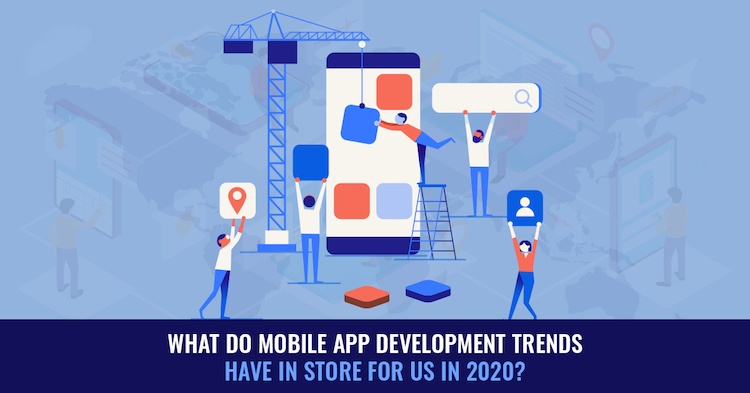Smartphones haven’t just revolutionized the physical world around us. They have pushed the scope of our imagination into hitherto unknown domains.
Today, we use them to make virtually every facet of our daily lives easier. The advent of handheld smart devices has, in turn, ushered in an era of innovation and ideas.
For example, the mobile app industry has earned rich dividends for visionary entrepreneurs who bet on the success of this vertical. Statista expects the total revenue generated by the mobile app industry to be around USD 581.9 billion by 2020.
As a rule, mobile app development has enjoyed technological advancements driven by the organizations and users alike.
2019 turned out to be an amazing year for mobile apps. Be it IoT or AI mobile applications, the industry grew in leaps and bounds.
The success of 2019 is expected to define the trends of 2020. With the consumer base spending the lion’s share of their time on smartphones, almost every business chooses to leverage their proposition through a mobile app.
Blockchain
Blockchain technology is game changer. Businesses and startups the world over have used it to develop apps and software solutions that are powered by blockchain.
According to Gartner, the total revenue accrued through blockchain technology is expected to be around 3 billion USD by 2030.
With the help of IoT, blockchain technology can further improve the performance of apps. It can decrease your project costs, reduce risk and speed up transactions.
Blockchain solutions are often offered as BaaS or Blockchain As A Service. Enterprises and startups alike use them.
BaaS enables the mobile app developers to connect their apps to cloud services. It can also send push notifications and manage app users.
Integration With IoT
IoT has been around for some time now. Thanks to the penetration of mobile technology across a wide range of industries, myriad opportunities have opened up for IoT.
Simply put, IoT is a network of devices connected via the internet, providing convenience through automation. Smart home technology is one example of the liaison between mobile app development and IoT.
Through mobile apps, you could regulate your house thermostat away from home. You could also access your home security features, lock or unlock the front door, etc. household appliances such as refrigerators can also be connected to mobile apps.
According to globaldata.com, the fusion of IoT with mobile apps is expected to be a 143 billion USD market by 2020 – a 14 percent YoY increase from 2019. The coupling of IoT with mobile app development is expected to impact the healthcare, automobiles and household devices industries.
Wearables
Wearables are a popular technology that enjoys YoY incremental traction. It has helped to revolutionize the fitness and healthcare industry, relaying life-saving information to all the critical stakeholders.
App integration for wearables is vital to the service proposition of this product. Some of the biggest brands in the world such as Apple and Uber are heavily invested in the development and improvement of wearable technology.
AR And VR
The global tech giants such as Apple and Google are extensively incorporating AR and VR technologies into their devices. They are expected to make their debut very soon on social media platforms as well.
Across digital interfaces, both technologies will be deployed as a tool for branding. Together, they are expected to usher in the age of the “Beyond The Screens” AR/VR apps.
Both Instagram and snapchat have already released their AR filters. The latter can convert any human face into animated characters.
Cloud-Based Apps
Cloud based apps are a new and growing competition to native mobile app development. This enables developers to create apps that can operate on both Android as well as iOS on the cloud. This is possible because the app doesn’t run on the device natively.
Users can access the app with the help of their mobile web browser. They do not have to install the application on their phones.
Cloud based apps enjoy a host of benefits that include
- Security
- All devices can access the same app
- Does not occupy space on the mobile device
- Is not limited by the computing power of the smartphone alone
- The turnaround time for the app development process is faster than in native apps
The reason behind the state-of-the-art security of these apps is the fact that all the information related to it is safely stored on the cloud server. As opposed to native mobile apps, it operates more like an extension of a cloud-based app.
If you are looking to launch a secured app within a short span of time, cloud-based app solutions are perhaps the best options.
Please note – developing cloud-based apps is a niche trade that requires a unique set of skills. Only a handful of specialized companies are equipped to deliver such services.
Fintech: Payment Gateways
Payment Gateways are some of the most widely used apps in the world today. As opposed to the cumbersome and inefficient methods of carrying cash or punching in detailed account or Debit card numbers for online transactions, we can simply sync our bank accounts with the payment gateway of our choice. This will allow us to transfer money readily.
Today, mobile wallets are integrated with cost gateways. This enables the payment process to become smoother and quicker.
Mobile wallets such as PayPal, Google Pay and Amazon Pay are a staple of most online payment customers today.
Apps For Foldable Devices
The foldable OLED display by Samsung has presented an unique opportunity. Developers of operating systems are scampering to create platforms that improve the smartphone experience.
For example, in 2018, Google announced that, henceforth, Android phones will provide foldable support. They will do so using the screen continuity API.
Samsung contends that it has already optimized hundreds of Android apps so that it can function on the Galaxy Fold. These include MS Office, VSCO, Facebook, Spotify, Twitter and Amazon Prime Video.
Foldable phones are expected to have a substantial impact in 2020. So, if you are looking to launch your mobile app this year, you might want to take into consideration strategies that can run the app on foldable devices as well.
Typically, foldable devices unravel to reveal large screens with the following benefits –
- It offers an immersive and detailed experience
- Thanks to multi-windows, users can multi-task with ease.
Gaming and video streaming apps have the most to gain from foldable devices. The increased screen size means more room to explore the developer’s creativity and imagination.
Alternatively, the added space can also be utilized for more console controls and information.
Beacon Technology
Beacon technology enjoys universal applications across multiple industries such as healthcare, hospitality, museums, etc. It is a great tool when it comes to proximity marketing and location technology.
Thanks to its user-friendly approach, anybody can adapt it with ease.
Beacons are a form of wireless transmitters. They send signals with the help of Bluetooth technology. This allows for exchange of information to support vital business functions such as sales, etc.
In the retail sector, beacons are extensively used in tandem with IoT.
Beacon technology is extensively used by the mobile app industry for payments, treasure hunting, machine learning, AI applications, etc.
5G Technology
It is widely estimated that 5G network will be 100 times faster than 4G network. The technology will no doubt transform industries such as data security, augmented reality and 3D gaming.
5G technology is also expected to disrupt mobile app development in an unprecedented fashion. At these fast speeds, the technology is likely to open new doors and opportunities in mobile apps hitherto unseen.
Instant Apps
Instant mobile apps are all the rage right now, among businesses and people alike. Whether it is Android or iOS, developers enjoy better conversion rates with instant apps over regular apps.
Top gaming companies such as Hothead Games and King have substantially increased their player acquisition with the help of instant mobile apps.
Instant mobile apps are a form of native mobile application. You do not have to download them either on iOS or Android smartphone.
Compared to regular mobile apps, they are smaller in size, providing the working functionalities of a website.
On one hand, they offer quality user experience. On the other, they consume very little phone memory.
Brands that use instant mobile apps include Skyscanner, Wish – Shopping Made Fun, Red Bull TV, New York Times Crossword, Hollar Inc.
Chatbots
Mobile apps across diverse industries such as rideshares, food delivery and online shopping integrate chatbots into their core functions. This greatly reduces the pressure on manned call centres while providing prompt support to aggrieved customers.
One Gartner study suggested that chatbots are expected to save companies around 8 billion USD between 2018 and 2020.
On-Demand Apps
Apps that are designed to provide instant services or address urgent needs are referred to as on-demand apps. Through these interfaces, users can ask for a certain product or service. The same will be delivered to the user.
Prime examples of on-demand apps would be Lyft and Uber, two of the most used apps on the planet. Other examples include apps for tailors, dry cleaners and even home-cooked food.
On-demand apps continue to serve the crucial segment of daily chores and errands for common people. Necessity is the mother of invention and on-demand apps help alleviate the pressing needs of a large consumer base.
EMM and APM
Enterprise Mobile Management (EMM) and Application Performance Management (APM) are crucial elements within the enterprise mobile app development ecosystem.
In 2016, the mobile metrics APM was integrated into Google. The goal was to eliminate the snap that adversely affected the app performance. During the app testing process, quality assurance testers prefer the APM tool.
Through Enterprise Mobility Management or EMM, organizations can secure mobile devices that are being used by the employees. This facilitates the business process through mobile computing.
In addition to making the flow of information end-to-end secure, it also helps in spreading information across the board.
If 2019 was any indication of the rapid advancement that the mobile development vertical is enjoying right now, 2020 promises to be even more exciting and interesting.












